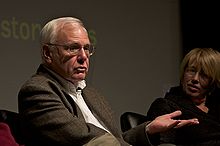Charles P. Thacker
Charles Patrick "Chuck" Thacker (born February 26, 1943 in Pasadena , California - † June 12, 2017 in Palo Alto , California) was an American computer scientist . He was head of a research group at Microsoft Research in Silicon Valley that deals with reconfigurable computing and was a Turing Prize winner . He was involved in the development of the first PC with a graphical user interface ( Xerox Alto ), Ethernet and tablet PCs, as well as in the development of three major research centers.
biography
Thacker was the son of an engineer and studied first at Caltech , then at the University of California, Los Angeles , and finally in 1967 at the University of California, Berkeley to obtain a bachelor's degree in physics. In order to finance his postgraduate studies , he first worked as a mechanic and electrical engineer and then became a member of JCR Licklider's “Intergalactic Computer Network”, within the framework of which the time-sharing system SDS 940 was developed. Thacker began to be interested in computers and met L. Peter Deutsch and Butler Lampson . With these he founded the spin-off Berkeley Computer Corp., which was dissolved soon after the construction of the multiprocessor BCC-500, whose processors and memory came from Thacker.
Thacker and some colleagues were transferred to the newly founded Xerox Palo Alto Research Center ( PARC ) in 1970 , where he initially helped develop the Multiple Access Xerox Computer (MAXC), the first time-sharing system with semiconductor memory. Building on this work, Thacker eventually led the development of the Xerox Alto personal computer (with Butler Lampson, Ed McCreight, and others). He designed the CPU, its microcode and the display controller for the machine. He was also co-inventor of the Ethernet - LAN method (with Robert Metcalfe , David Boggs and others) and contributed significantly to many other projects in, including the development of the first laser printer . Thacker moved from Xerox PARC to the Xerox Systems Development Department, where he was involved in the development of computers such as the Xerox Dorado and the Xerox D0, which was eventually passed on to the Xerox PARC, with which Thacker also went back to PARC.
In 1983, Thacker left Xerox with Robert W. Taylor , Butler Lampson and others, and in 1984 founded the Systems Research Center (SRC) of the Digital Equipment Corporation (DEC) with them . Among other things, he developed the ADU (Alpha Demonstration Unit), the first computer with the Alpha processor , and the Firefly system, the first multiprocessor workstation, as well as the Gigaswitch / ATM network technology.
From around 1991 Thacker was in talks with Microsoft , where he initially saw no place for himself, but then advocated the establishment of a Microsoft research offshoot in Silicon Valley. In 1997 Nathan Myhrvold finally recruited him to work with Roger Needham for two years in building Microsoft's research center in Cambridge , England . After returning to the United States, Thacker developed the hardware for Microsoft's tablet PC based on his experience with the interim Dynabook at PARC, and with the pen-based hand-held Lectrice computer at DEC SRC. Thacker then moved to the research center in Mountain View in Silicon Valley, which has since been established.
Thacker had been married since 1964 and had two daughters.
Awards
Thacker was a Microsoft Technical Fellow, a fellow of the Association for Computing Machinery (ACM) and the Computer History Museum, and a member of the National Academy of Engineering and the American Academy of Arts and Sciences . In 2004 Thacker was awarded the Charles Stark Draper Prize , along with Alan Kay , Butler Lampson and Robert W. Taylor . In 1996, Thacker received an honorary doctorate from the ETH Zurich in recognition of his far-sighted conception of the first Alto workstation computer, his pioneering contributions to the first local computer network, Ethernet, and for his original ideas in the construction of high-performance networks. In 2007 Thacker was awarded the John von Neumann Medal “for a central role in the creation of the personal computer and the development of networked computer systems” .
In 2010 he received the Turing Award from ACM for his role in the development of the first modern PC; Butler Lampson and Alan Kay , who worked with Thacker on the Xerox Alto, among others, had received the same award in 1992 and 2003, respectively. For 2017 he was (posthumously) awarded the Eckert-Mauchly Award .
Web links
- Two biographies on the appointment as Technical Fellow and on the occasion of the presentation of the Turing Awards at Microsoft (English)
- Oral History (PDF; 101 kB), Interview with Thacker, conducted in 2007 by Al Kossow for the Computer History Museum (English)
Individual proof
| personal data | |
|---|---|
| SURNAME | Thacker, Charles P. |
| ALTERNATIVE NAMES | Thacker, Chuck; Thacker, Charles; Thacker, Charles Patrick |
| BRIEF DESCRIPTION | American computer scientist |
| DATE OF BIRTH | February 26, 1943 |
| PLACE OF BIRTH | Pasadena , California |
| DATE OF DEATH | June 12, 2017 |
| Place of death | Palo Alto , California |
